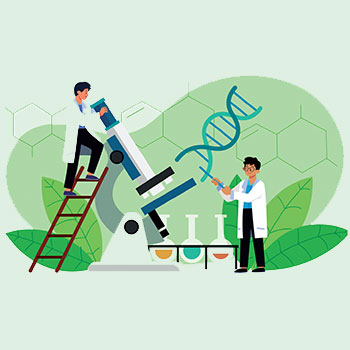An Eye-Opener on the Life Sciences Sector

Goutam Bhattacharya is a seasoned pharmaceutical and healthcare professional with over three decades of working experience in leading multinational pharmaceutical and medical device companies in India. He has worked in senior leadership positions with companies in India like LG Life Sciences; Boston Scientific and Win-Medicare.
He joined the Life Sciences Sector Skill Development Council (LSSSDC) as CEO in April 2023. LSSSDC is an industry-led not-for-profit organisation setup as Sector Skill Council by NSDC under the aegis of Ministry of Skill Development and Entrepreneurship. It is an approved vocational education awarding body by NCVET under the Ministry of Skill Development and Entrepreneurship. He is leading the Council from the front. He is passionate about adding value to life sciences sector skilling, capacity building and entrepreneurship. He has been collaborating with teams of multiple stakeholders from across life sciences ecosystem. Corporate Citizen gives an insight into his work
Corporate Citizen: Could you tell us about the emergence of the Life Sciences Sector Skill Development Council (LSSSDC)?
Goutam Bhattacharya: The Life Sciences Sector Skill Development Council (LSSSDC) was established in 2014 by CII and National Skill Development Corporation (NSDC) under the aegis of the Ministry of Skill Development and Entrepreneurship. It is an industry-led, not-for-profit organisation that awards Vocational Education and Skill Certification for Life Sciences Sector. This Council is mandated to serve and address skill shortfalls in the Life Sciences Sector in India like Pharmaceuticals (including Cosmetics, AYUSH and Nutraceuticals), Medical Devices, Biotechnology, and Research and Development services related to Occupations.
CC: Could you further elaborate on Life Sciences Sector?
The Life Sciences Sector encompasses all sub-sectors attempting to treat, manage and cure diseases, make human life better and enhance healthy living.
From ideation of medical interventions to testing to approvals to manufacturing to marketing, to usage falls under the ambit of Life Sciences Sector.
The total Life Sciences sector is estimated to be more than US$ 80 billion in turnover at present, with a robust growth rate averaging above 7 to 8 per cent Compound Annual Growth Rate (CAGR).
The pharmaceutical sector is estimated to reach a turnover of more than US$ 130 billion by 2030. This sector is less likely to be impacted by any recessionary headwinds and would require a large number of skilled manpower continuously.
Consequently, we are actively aligning with academic institutions nationwide to join forces, as the workforce will come from these academic institutions in future. Indian Life Sciences industry is transitioning from ‘volume based to value based', thus a lot of emphasis is on the quality of products and innovation. This will drive robust growth for the sector and extremely bright future for those joining the sector.
CC: How is your interaction with the Life Sciences industry?
Very frequent. Our council is industry-led and thus we have frequent interactions with all stakeholders. We interact with all levels of employees in the company from interns and apprentices to the CEOs. We have top industries and industry associations in our Governing Board. We interface with the industry in multiple ways.
"If the allure of an international career excites you, explore export management. India stands as the pharmacy capital of the world, implying that countries beyond India consume Indian pharmaceutical products"
- Goutam Bhattacharya
Skill gap studies

For the companies and industry, we conduct skill gap studies periodically by interacting with industries to identify the skilling requirements for the job roles and amongst the employees. We curate courses with the help of industry for the identified job roles where skilled manpower is required the most and create a curriculum and content that the accredited training partners must follow. We also conduct a Training of Trainers (ToT) programme to equip the trainers with the required information and training to train, further on the job roles.
We coordinate with industry partners for subject matter experts, master trainers, and validation of Question Banks for assessments, thus enriching the quality of skilling.
We engage with the industry for apprenticeship programme, placement of candidates and for conducting up-skilling activities for the employees. We also engage them for their contribution of CSR towards skilling. So, as you see, in all our endeavours, industry is at centre stage and all products are designed for equipping industry with skilled manpower.
CC: Please describe your efforts to connect academics and the industry.
This field comprises two components: the supply side and the demand side. On the supply side, manpower is sourced from academia, while the industry represents the demand side. The industry frequently requests access to skilled manpower, expressing a desire to avoid the lengthy process of waiting and training numerous students for hours and months before integrating them into specific job roles. Conversely, students and academia argue that they are provided a foundation in life sciences through relevant courses, but find that these fundamentals are insufficient for immediate job placements.
As a Life Sciences Sector Skill Council, our primary focus is identifying and addressing the skill gaps highlighted by the industry. When engaging with various sectors, industry representatives emphasise specific skill areas crucial for fulfilment. For instance, in pharmaceutical manufacturing, they seek individuals who are well-versed in good manufacturing, good documentation, and good clinical practices.
The industry expresses a preference for candidates already equipped with these skills, as it facilitates a seamless assimilation into the workforce. With a workforce possessing prior knowledge, a brief seven-day training session on company-specific nuances can efficiently prepare them for their roles. To meet this demand for readily skilled individuals, the education of students through our courses leading to certification becomes a key criterion for students, ensuring they possess the necessary qualifications and industry-demanded skills.
CC: Has it been recognised by the Pharma Industry sector?
Certainly, it's an ongoing process. The importance lies in obtaining relevant certification. Essentially, if a student can demonstrate that they have achieved a skill certification or undergone vocational training through the Life Sciences Sector Skill Council, the industry readily acknowledges their proficiency. This certification signifies that the individual has undergone a thorough assessment for the skills relevant to their job role and has received official recognition in the form of a certificate.
In our role as a sector skill council and an awarding body, we are recognised for assessing and certifying individuals undertaking our vocational courses. Consequently, the industry universally acknowledges the value of our certificates. This positions us as a crucial intermediary, bridging the gap between academia and industry. We aim to empower both students and the existing workforce, enhancing their job readiness and aligning their skills with industry requirements.
CC: When you say about students being job-ready, does it apply to other specialties and streams of education as well?
It encompasses degrees in Art, Commerce, Science, and Technical disciplines, offering a diverse array of courses tailored to each field. To illustrate, a pharmaceutical organisation often seeks students with a technical background suitable for placement in Research and Development. This necessitates knowledge in biotechnology, biology, botany, or zoology. In the medical sector, a background in medicine is imperative for roles in Medical Affairs or Pharmacovigilance or Clinical Research. However, the Arts and Commerce stream students can also participate in Life Sciences industry by skilling through suitable courses.
Consider the realm of clinical research, crucial for newly developed products undergoing clinical testing. This entails trials that require skilled individuals. Life sciences students are well- suited for such activities. Additionally, doctors can contribute to Clinical Research Organisations (CROs) and engage in pharmacovigilance activities. So MBBS too has a role in this entire value chain.
CC: What about MBA students?

Now, let's delve into the area of sales and marketing. Consider an individual with an MBA. What does an MBA focus on? The core objective is to devise effective strategies for marketing a product, irrespective of its nature. Speaking from personal experience as an MBA with a life sciences background, I recognise that this applies universally to MBAs from various backgrounds. The key lies in the ability to craft strategies for a product, and the product itself becomes secondary.
Whether it's acquiring knowledge about a pharmaceutical drug or understanding the market dynamics for an iron product, the intellect and attitude to formulate effective strategies are paramount. MBA graduates, regardless of their academic background, possess the potential to comprehend requirements and develop strategies, supported by market research, to promote products from paracetamol to high end biologics.
This underscores a significant role and ample opportunities for MBA graduates to contribute to life sciences organisations. This holds not only for smaller entities but also for sizable life sciences organisations where the need for strategic thinkers is substantial. They actively engage with placement cells at major management institutions, selecting students for various roles. Having a background in biology within life sciences is beneficial, but organisations are open to individuals who can acquire this knowledge. However, possessing prior knowledge is an additional advantage.
Sales teams and organisations are currently prioritising effective salesmanship over specific academic backgrounds. If a commerce graduate proves to be a more adept salesperson for pharmaceuticals than a life sciences graduate, they are considered suitable. In such cases, commerce graduates are provided with training in biology subjects within the organisation. This presents a significant opportunity for professionals from any academic background. They can undertake skilling courses and certification from the Council and be ready for Life Sciences job opportunities. The emphasis is on skills and capabilities rather than the specific educational stream.
"Within the pharmaceutical and life sciences sectors, there is a substantial demand for professionals well-versed in intellectual property rights matters"
Advice for educational institutions

My humble request to them would be to introspect and critically look at what you are teaching the students right now. That means scrutinising the existing syllabus. Is it solving the purpose? Is it making your students ready for the industry? Does it match the aspirations of the students? Or are we just running year by year the same curriculum without any alteration? Would you want to go into the industry and find out what are the skill gaps and what knowledge is already available with the council?
Our combined efforts can lead to a smoother transition towards the future of life sciences education. Let me explain:
Leveraging existing resources:
- We've already developed degree and diploma courses and conducted analyses, creating a strong foundation for collaboration.
- This enables us to engage in productive discussions, identifying areas where current curricula align with proposed new-age skills and vocational requirements.
- Seamless integration of these skills can be achieved by strategically incorporating them into existing programmes.
Synergy for shared success:
- I recently presented at a conference where I discussed the vast opportunities in life sciences and potential collaboration avenues between the Sector Skill Council and academic institutions.
- By joining forces, we can create a more efficient and effective educational landscape that prepares students for real-world success in the immensely potential life sciences industry.
Moving forward:
- This partnership is not only achievable but also essential for equipping the next generation with the necessary skillset to thrive in the evolving life sciences sector.
- Let's leverage our combined expertise and resources to create a comprehensive and future-proof educational experience for all.
Improvements suggested for educational institutions:
- Create courses which makes students industry ready
- Adopt National Education Policy (NEP) 2020
- Embed apprenticeship in industry and practical experience into the course
- Clearer and more concise language.
- Emphasis on collaboration and mutual benefit.
- Focus on actionable steps and future-oriented approach.
- Removal of unnecessary repetition and informal expressions.
It is worthwhile to mention here that the recent NEP 2020, mandates vocational skilling and education to all college students. We as a council have collaborated with CBSE and other academic institutions. We are open to collaborate with state school boards. We are ready to collaborate with academic institutions.
We are not expensive. We are here to serve the common objective. That means your students should be skilled, industry- ready, and should get into the sector to do worthwhile work that should propel our country from where we are to the next destination. Advice for educational institutions
CC: As per the National Education Policy (NEP), a student can take up optional subjects. Is it possible for him to pick up a skill?
Yes. Individuals at various educational levels, whether they are in the 10th grade, or 12th grade, pursuing undergraduate studies, or engaged in postgraduate programmes, can explore a diverse range of courses offered by the Life Sciences Sector Skill Council. As a council, our mission extends to serving students facing challenges, particularly those who may be marginalised or encountering financial barriers to pursuing higher education. Consider, for instance, a student in a remote area who is currently in the twelfth grade and desires to acquire skills through our courses. Their goal is to secure employment in a pharmaceutical organisation, possibly as a production operator or a packaging assistant. Our commitment is to facilitate skill development and provide opportunities for individuals in such circumstances to enhance their employability in the life sciences industry.
"Regulatory affairs also offer a distinct career option, involving the creation of dossiers for submission to various countries"
CC: A career in Pharma has great potential. Please elaborate…

For individuals facing the dilemma of choosing between a career in life sciences or pursuing other paths, I encourage you to seriously consider the field of life sciences. The sector is currently valued at around US$ 70 to 80 billion and is projected to grow substantially, reaching over 500 billion dollars by the year 2047. By 2030, it is anticipated to touch approximately US $ 100 to 130 billion. The scale of these figures, when multiplied by 80 or 90, is truly remarkable.
As a student contemplating a career in life sciences, you may wonder about the opportunities available. Let me provide a compelling example
- If you possess IT skills, the integration of
artificial intelligence (AI) into the life sciences
sector is substantial
I strongly advise not abandoning your studies in AI. Instead, consider combining your IT expertise with a keen understanding of life sciences avenues. This isn't meant to discourage aspiring IT professionals; rather, it's an invitation to explore the vast potential within life sciences sector. - Avoid pursuing a path that doesn't resonate with your interests, as it may lead to dissatisfaction. Take the time to delve into concepts like Pharma 4.0, an aspect of Industry 4.0, to gain insights into the evolving landscape of the life sciences industry.
- Digital integration is pervasive across all fields, and the pharmaceutical industry is no exception, with a significant influx of AI alignment through Pharma 4.0. I urge all students to contemplate the opportunities within this digital transformation.
- Now, if you find yourself not particularly adept in the digital realm, fret not, there are umpteen viable paths. As mentioned earlier, any product seeking market entry requires clinical validation, involving testing in animals and humans through various phases of clinical studies. Consider forging a career in clinical research, as this field is poised to experience substantial growth.
- For those unfamiliar with the term, pharmacovigilance presents another avenue. Picture a role where you investigate adverse events associated with products launched by pharmaceutical companies. Every pharma organisation has a pharmacovigilance department responsible for monitoring and reporting such events, offering a promising career path.
- If the allure of an international career excites you, explore export management. India stands as the pharmacy capital of the world, implying that countries beyond India consume Indian pharmaceutical products. As an export manager or executive, you can engage in negotiations, international product sales, and regulatory work, delving into the intricacies of a highly regulated market.
- Regulatory affairs also offer a distinct career option, involving the creation of dossiers for submission to various countries. This role demands a keen understanding of the regulatory landscape in pharma, biotech, and clinical research, where adherence to stringent regulations is paramount.
- The pharmaceutical industry presents a multitude of career options beyond traditional roles like sales and marketing. Though these areas demand hard work, especially in the initial stages of your career, I encourage you to consider them as viable and rewarding career paths.
- In conclusion, for individuals who aspire to
work in the back office of the pharmaceutical
industry and prefer not to engage in sales and
marketing activities, especially if you consider
yourself an introverted person, I strongly
recommend pursuing a career in Intellectual
Property Rights (IPR).
Within the pharmaceutical and life sciences sectors, there is a substantial demand for professionals well-versed in intellectual property rights matters. This is particularly true due to the high level of innovation associated with product development, such as in medical devices and diagnostics. Consider aligning yourself with startups, as they often require dedicated intellectual property support.
Currently, there is an ongoing development of intellectual property courses by the council. In my capacity as CEO, one of the challenges I set for the team is to design allied courses that cater to the diverse interests of students, facilitating their pursuit of Intellectual Property Rights. Reflect on the potential of IPR for your career— it's truly superb.